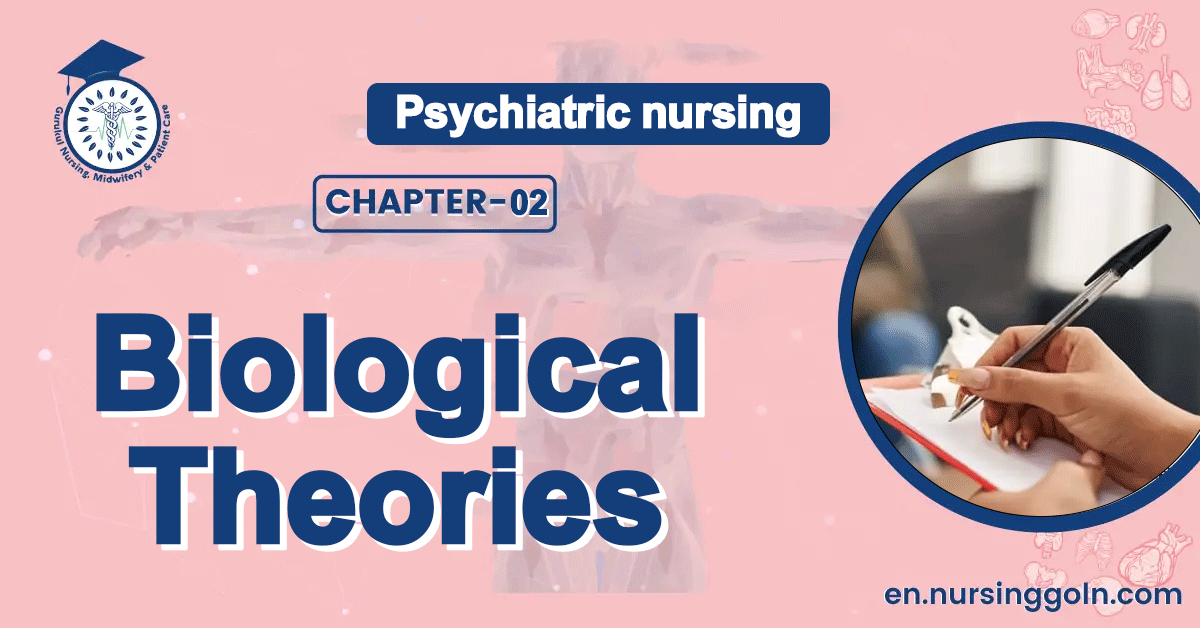Biological Theories – This book covers the entire syllabus of “Psychiatric Nursing” prescribed by the Universities of Bangladesh- for Basic and diploma nursing students. We tried to accommodate the latest information and topics. This book is an examination-friendly setup according to the teachers’ lectures and examination questions.
At the end of the book previous university questions are given. We hope in touch with the book students’ knowledge will be upgraded and flourish. The unique way of presentation may make your reading of the book a pleasurable experience.
Biological Theories
Biological Theories: The biological approach argues that mental disorder occurs due to physical and chemical changes in brain. The aims of treatment are (1) to correct this chemical imbalance or (2) to repair physical damage and eliminate it. According to this approach, a sufferer is also a sick person and needs a medical doctor to recover.

Clarke and Walsh (2009) state that psychiatric nurses should recognize the importance of the mind-body relationship in maintaining health while administering medicines prescribed by psychiatrists in the scope of the biological approach. Stickley and Wright (2014) state that nurses can take biological factors, such as genetics or chemical imbalances, into consideration when trying to understand an individual’s problems, and they also state that it is vital for nurses to know the positive and adverse effects of biological treatment.
Similarly, Kneisl and Trigoboff (2013) state that nurses are responsible for the physical wellbeing of patients in psychiatric care. For example, they state that providing care for patients who receive treatments such as electroconvulsive therapy or psychosurgery is the nurses’ responsibility. Boyd (2002) states that nursing evaluations in physiological field of Neuman’s Systems Model and Roy’s Adaptation Model are both originated from Selye’s model and that the biological theories influenced the psychiatric nursing.
For example, the aim of the holistic approach for an individual who lost his wife or her husband, and who is now suffering from shock and feeling deep, sorrow, is to determine how this case affects the individual in every aspect, including appetite, sleep, relaxation, energy level, mood, family relationships, and interaction with other individuals.
Social Theories: Certain social factors such as housing, financial status, social network, business relationships, and romantic relationships are necessary for good mental health. According to social theory, suffering due to mental problems may occur because when any of these factors are lacking. Therefore, the focal point in therapy is to find solutions for the factors that are missing from the individual’s life. According to this theory, the individual is not ill and does not need medical help.
Abnormal behaviors emerge as a response to the lack of social support in the individual’s life rather than due to his or her “insanity.” For example, a psychiatric nurse tries to determine the social aspects (level of family support; how age, sex, culture and ethnicity affect her present situation) of the problems of a young woman who is in sorrow, who has worries about hurting her children, and who cannot cope with this situation, using social model, If her children are at risk, the nurse can ask social services for help.

Moreover the nurse can help the young woman to be placed in a mental health clinic, both for her sake and her family’s. Boyd (2002) states that many social theories highlight psychiatric nursing practices and reports that nurses can use the following social theories in their practices.
Family Dynamics Theories: Family dynamics theories focus on social interactions and interpersonal relations within a family. The family is regarded as an open system in these theories,
and it is accepted that behavior of an individual family member affects the entire system. Boyd (2002) states that family theories are highly beneficial, especially for use by nurses who evaluate family dynamics and plan initiatives.
These theories help nurses establish a collaborative relationship with the patient and his or her family with respect to health problems. Since the symptoms of many mental disorders, such as hallucinating and delusions, affect the entire family and relationships within the family, numerous family initiatives are related to these theories.
Balance theory: Balance theory is especially beneficial for mental health services provided in rural regions where resources are limited. According to this theory, case managers can help with the interactions of the patients and their family members in the health system, and work collaboratively through determining communication barriers in this process. For example, a patient might miss his or her appointment due to a transportation problem.
In this instance, the case manager can help the patient explain his or her problems with the system to get a new appointment. Role Theories: Role theories highlight the importance of social interaction. Psychiatric nurses can use the concept of roles to understand the role the patient plays in his or her family, society, and group interactions. It is not possible for an evaluation to be adequately completed while ignoring an individual’s role in his or her family and society.
